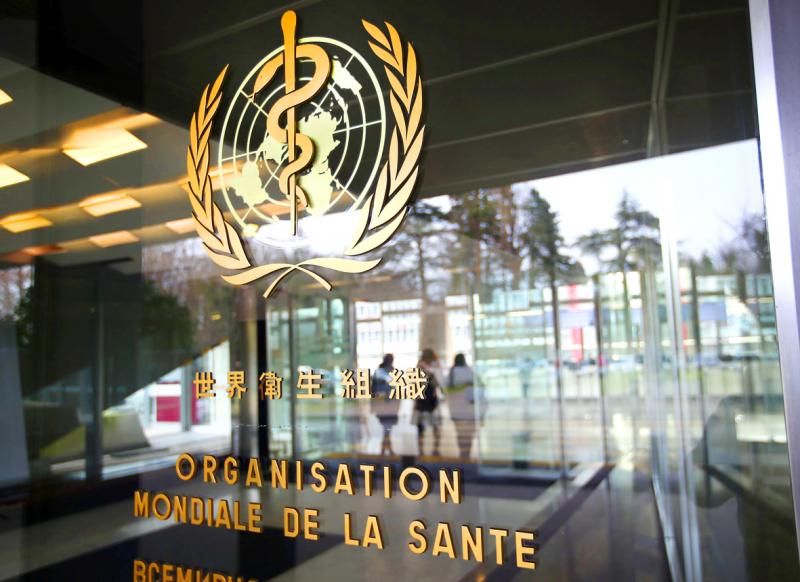The WHO Secretariat should clarify how it responded to reports from various nations at the onset of the COVID-19 pandemic last year, the Ministry of Foreign Affairs said yesterday, after WHO Director-General Tedros Adhanom Ghebreyesus repeated his claim that Taiwan had not sounded the alarm on human-to-human transmission.
Tedros made the remark at the global health body’s regular news briefing on Monday, when he was asked how it responded to and acted on Taiwan’s e-mail on Dec. 31 last year warning about potential human-to-human transmission of the novel coronavirus.
“News resources today indicate that at least seven atypical pneumonia cases were reported in Wuhan, China. Their health authorities replied to the media that the cases were believed not SARS; however, the samples are still under examination, and cases have been isolated for treatment. I would greatly appreciate it if you have relevant information to share with us,” the Centers for Disease Control said in the e-mail.

Photo: Reuters
When he revealed the e-mail’s existence on April 11, Minister of Health and Welfare Chen Shih-chung (陳時中) said in Taipei that “isolated for treatment” implies that health experts should be on guard about human-to-human transmission of a disease.
“There was no reference made in that query to anything other than what had been previously reported in news media,” WHO Health Emergencies Program executive director Michael Ryan told Monday’s news conference, after summarizing the content of the e-mail.
When the news conference’s coordinator signaled that they were ready to take another reporter’s question, Tedros said that he wanted to make his stance clear again.
“The first e-mail was not from Taiwan. Many other countries have already, well, asked for clarification. The first report came from Wuhan, from China itself,” Tedros said. “Taiwan didn’t report any human-to-human transmission. This has to be clear.”
“The e-mail from Taiwan, like other entities, was to ask for clarification. Nothing else,” he said.
Ministry spokeswoman Joanne Ou (歐江安) yesterday said in a statement that the key is how the WHO Secretariat assessed and responded to the reports it received, rather than which nation filed the report first.
The WHO Secretariat should further explain what reports it had received at the onset of the disease last year and how it acted on the reports, she said.
Taiwan’s report to the WHO Secretariat was fulfilling its responsibility to maintain the global healthcare system, Ou said, again urging the WHO to adhere to its founding purpose and help all nations contain the “Wuhan pneumonia” crisis with professionalism and impartiality.

Chinese spouse and influencer Guan Guan’s (關關) residency permit has been revoked for repeatedly posting pro-China videos that threaten national security, the National Immigration Agency confirmed today. Guan Guan has said many controversial statements in her videos posted to Douyin (抖音), including “the red flag will soon be painted all over Taiwan” and “Taiwan is an inseparable part of China,” and expressing hope for expedited reunification. The agency last year received multiple reports alleging that Guan Guan had advocated for armed reunification. After verifying the reports, the agency last month issued a notice requiring her to appear and explain her actions. Guan

GIVE AND TAKE: Blood demand continues to rise each year, while fewer young donors are available due to the nation’s falling birthrate, a doctor said Blood donors can redeem points earned from donations to obtain limited edition Formosan black bear travel mugs, the Kaohsiung Blood Center said yesterday, as it announced a goal of stocking 20,000 units of blood prior to the Lunar New Year. The last month of the lunar year is National Blood Donation Month, when local centers seek to stockpile blood for use during the Lunar New Year holiday. The blood demand in southern Taiwan — including Tainan and Kaohsiung, as well as Chiayi, Pingtung, Penghu and Taitung counties — is about 2,000 units per day, the center said. The donation campaign aims to boost

The Kaohsiung Tourism Bureau audited six hotels in an effort to prevent price gouging ahead of Korean band BTS’ concert tour in the city scheduled for Nov. 19, 21 and 22 this year. The bureau on Friday said that the audits — conducted in response to allegations of unfair pricing posted on social media — found no wrongdoing. These establishments included the local branches of Chateau de Chine, Hotel Nikko, My Humble House, and Grand Hai Lai, it said, adding that the Consumer Protection Commission would have penalized price gougers had the accusations been substantiated. The bureau said the Tourism Development Act

BACK TO WINTER: A strong continental cold air mass would move south on Tuesday next week, bringing colder temperatures to northern and central Taiwan A tropical depression east of the Philippines could soon be upgraded to be the first tropical storm of this year, the Central Weather Administration (CWA) said yesterday, adding that the next cold air mass is forecast to arrive on Monday next week. CWA forecaster Cheng Jie-ren (鄭傑仁) said the first tropical depression of this year is over waters east of the Philippines, about 1,867km southeast of Oluanpi (鵝鑾鼻), and could strengthen into Tropical Storm Nokaen by early today. The system is moving slowly from northwest to north, and is expected to remain east of the Philippines with little chance of affecting Taiwan,